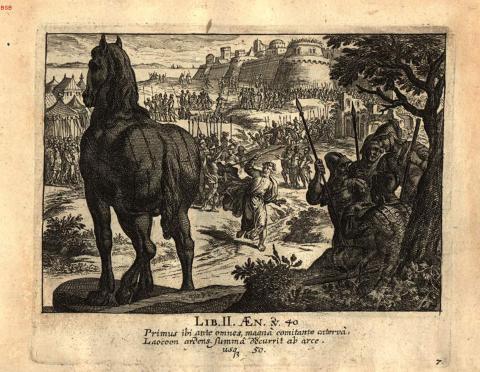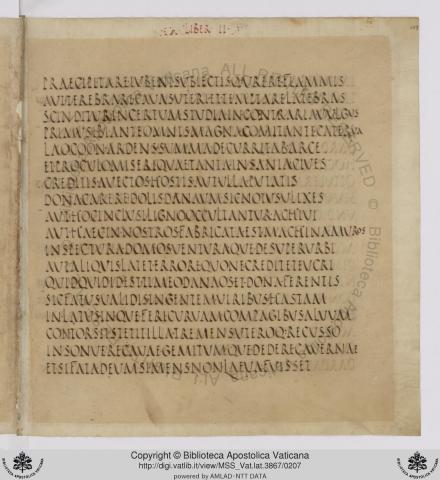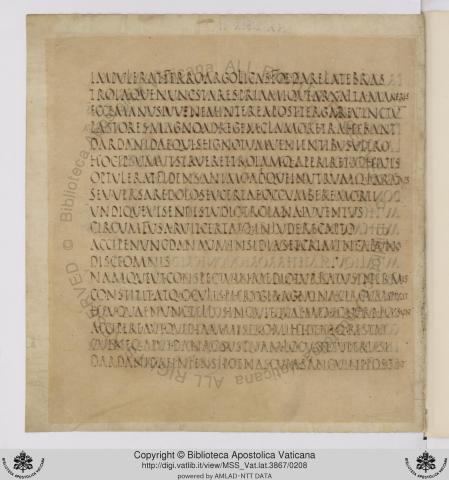Prīmus ibi ante omnēs magnā comitante catervā40
Lāocoōn ārdēns summā dēcurrit ab arce,
et procul 'Ō miserī, quae tanta īnsānia, cīvēs?
Crēditis āvectōs hostēs? aut ūlla putātis
dōna carēre dolīs Danaüm? Sīc nōtus Ulixēs?
aut hōc inclūsī lignō occultantur Achīvī,45
aut haec in nostrōs fabricāta est māchina mūrōs,
īnspectūra domōs ventūraque dēsuper urbī,
aut aliquis latet error; equō nē crēdite, Teucrī.
Quidquid id est, timeō Danaōs et dōna ferentēs.'
Sīc fātus validīs ingentem vīribus hastam50
in latus inque ferī curvam compāgibus alvum
contorsit. Stetit illa tremēns, uterōque recussō
īnsonuēre cavae gemitumque dedēre cavernae.
et, sī fāta deum, sī mēns nōn laeva fuisset,
impulerat ferrō Argolicās foedāre latebrās,55
Trōiaque nunc stāret, Priamīque arx alta manērēs.
notes
Manuscripts: M | P 40-46, 47-56 | R 40-54, 55-56
40: Prīmus ante omnēs: like ārdēns (41) and procul (42), indicating Laocoon’s intense eagerness (C-R). I.e., taking the lead in his eager partisanship (G-K). In prose prīmus omnium (Storr). ibi: in temporal sense; i.e., at this juncture (Bennett). “At this (critical) moment,” when a very little would determine the action of the crowd (Knapp). magnā comitante catervā: cf. Dido’s appearance at 1.497. As there the queen is attended by magnā iuvenum catervā, so here the expression indicates that the priest is a leader, who commands a large following (F-B).
41: summā: from the highest part of the citadel (Chase). arce: Laocoon was a priest of Apollo, and had probably been engaged in his temple in the citadel (C-R). Why, when most of the Trojans were outside the walls, had Laocoon been on the citadel? Probably to get a commanding view of the country and sea, so as to detect signs of the enemy, because he did not believe they had returned to Greece (F-B).
42: et procul: verbs of saying are frequently omitted in narrative style; cf. 1.37 (F-B). Understand dixit or some such word, often omitted in poetry when the exact words are quoted (Carruthers). A fine detail: Laocoon begins to shout at a distance before he comes up to the crowd of excited, curious, and deluded Trojans (Horsfall). quae...īnsānia: “what madness is this?” The use of tam, talis, and tantus in nearly the sense of our simple demonstratives is very common in Latin (G-K). “All this,” “this great” (C-R). Supply est ista? (Frieze). The epic equivalent of the frequent insanis? or satin’ sanus es? in Comedy: Virgil has dressed up a phrase that any ordinary Roman might use at seeing something preposterous (Austin).
43: āvectōs: supply esse (Bennett).
44: dōna...Dan(ōr)um: the alliteration is effective; the rhythm runs quickly on to Danaum, with the caesura at dolīs blurred by the speed (Austin). Sīc nōtus (vobis) Ulixēs (est): i.e., “don’t you know him better than that?” (Comstock). sīc: i.e., so little (Bennett).
45–48: aut…aut…aut: Are the Greeks gone? Is the gift innocent? Do you trust Ulysses? Three questions to jolt the Trojans’ complacency, and now three weightier explanations, much nearer the mark, to set against them (Horsfall).
45: hōc...lignō: i.e., wooden structure (Bennett). Contemptuous, “this lump of wood.” lignō may = in lignum…, or may be local or instr. abl. (Knapp).
46–47: in: “against,” i.e., with hostile intent (Comstock). īnspectūra...ventūra: future participles expressing purpose (AG 499.2). Ventūra dēsuper rather refers to the descent of those in the machine upon the city, than to the machine itself (Frieze). urbī: = in urbem (Bennett) (AG 428 h). Dat. of personal interest (disadvantage) (Knapp) (AG 376). Vergil has in mind the siege towers of a later period, which, being rolled up to the walls of the besieged city, enabled the assailants from the several stories and from the summit of the tower to hurl their missiles, and to pass over upon planks to the battlements of the besieged. Thus the Greeks might intend to use the wooden horse (Frieze).
48: error: “trick.” A mistake (error) purposely caused is a deception (G-K). nē crēdite: nē with the imperative is a construction that belongs to early Latin (chiefly of feelings rather than actions), brought into epic by Virgil as an archaism (Austin).
49: One of Vergil’s most famous lines. The suspicion of an enemy’s gifts or kindness is so natural that the epigram has been quoted again and again in all ages (Sidgwick). The gifts of foes were proverbially fatal. So Hector was lashed to the chariot of Achilles by the girdle which Ajax gave him, while Ajax slew himself with Hector’s sword. Dido kills herself with the sword given her by Aeneas 4.647 (Page). et: = etiam (Comstock). ferentēs: acc. plural (G-K).
50–51: sīc fātus...contorsit: “so he spoke and hurled” (Comstock). validīs ingentem vīribus hastam: note the interlocked order (Bennett). ferī...alvum: artificial phrase, after Vergil’s manner. We should say “the joints of the monster’s rounded belly” (Sidgwick). compāgibus: is joined with curvam ( = curvatam) (Frieze). A favorite Virgilian ablative, where curvīs compāgibus would be more normal (Williams).
52–53: Notice that the preponderance (nine against three) of dactyls in these lines adds to the vividness (Carter).
52: illa: “it”; the spear (Frieze). As is common in Latin, marks the change of subject (C-R). uterōque recussō: ablative absolute expressive of cause. Virgil is fond of compounds in re-. Here recussus is used of the reverberation, and the compound enables the poet to emphasize the idea by the doubling of the sound of r, which was a trilled letter (F-B). If the re-cusso means anything more than “struck,” the re- must apply to the echo, and then the word recussus is really transferred from the sound to the uterus (Sidgwick).
53: gemitum: is the hollow sound given back by the wooden fabric (Frieze). cavae...cavernae: note the striking repetition of both sound and idea (F-B). A splendid noisy line; note the echoing assonance, with the hard consonants and the interplay of vowels, and the fading away of the sound shown in the rhythm gemitumque / dedēre / cavernae (Austin).
54: sī fāta de(ōr)um: sc. nōn laeva fuissent (F-B) (AG 517). deum is subj. gen., “ordained by the gods” (Knapp) (AG 343 note 1). fāta deum: “the will of the gods, expressed by their spoken word in oracles and visions” (Horsfall). laeva: as applied to fāta, means “unpropitious”; as applied to mēns, “misguided” (F-B); slightly different with fāta (“hostile”) and with mēns (“blind”) (Horsfall).
55: impulerat: what has been almost realized is sometimes, for the sake of vividness, represented as having actually occurred. So here. We should have expected the pluperfect subjunctive, impulisset (Bennett) (AG 517b). Argolicās: The Latin uses an adj. of possession when it can, often where English prefers “of” (G-K) (AG 343a). foedāre: AG 563 note.
56: stāret...manērēs: imperfect (see fuisset, 54), because, while the condition is still contrary to fact, its time has changed (Comstock). The change from the third person in stāret to the second in manērēs is quite in keeping with the rising emotion of the speaker, as he thinks of the irrevocable past (Bennett).
vocabulary
comitor, ātus sum, 1. dep. a.: to accompany, attend, follow, 3.660; p., comitātus, a, um, attended, accompanied, 1.312, et al. (comes)
caterva, ae, f.: a troop, squadron, band, 2.370; crowd, throng, multitude, 2.40; flock, 11.456.
Lāocoōn, ontis, m.: a Trojan prince and priest of Apollo, 2.41; serving also as priest of Neptune, 2.201.
ārdēns, entis: burning, hot, sparkling, flaming, 5.637; bright, 4.482; impassioned, ardent, eager, 1.423; spirited, fiery, 1.472; glowing, lofty, 6.130; fierce, furious, 2.529; angry, 6.467. (ardeo)
dēcurrō, cucurrī or currī, cursus, 3, n. and a.: to run down, hasten down, 2.41; descend, 5.610; run completely round, 11.189; sail over, sweep over, 5.212.
ō: (interj. expressing joy, grief, astonishment, desire, or indignation), O! oh! ah! w. voc., 2.281, et al.; w. sī and the subj., oh that, 11.415; sometimes placed after the word to which it relates, 2.281.
īnsānia, ae, f.: unsoundness; insanity, madness, folly, frenzy, 2.42; violence, fury, 7.461. (īnsānus)
āveho, vexī, vectus, 3, a.: to carry away, 2.179; (pass.), āvectus esse, to have sailed away, departed, 2.43.
Danaī, ōrum, m.: the Greeks, 2.327.
Ulixēs, is, eī or ī, m.: Ulysses, son of Laertes, king of Ithaca, and one of the Greek chiefs at Troy, distinguished for shrewdness and cunning, 2.44, et al.
inclūdō, clūsī, clūsus, 3, a.: to shut in, inclose, 6.680; secrete, 2.19; for interclūdō, stop, choke, 7.534; to mount, set, inlay, adorn, 12.211. (1. in and claudō)
līgnum, ī, n.: wood; structure, frame, 2.45; tree, 12.767.
occultō, āvī, ātus, 1, intens. a.: to hide carefully; cover up; hide, conceal, secrete, 2.45. (occulō)
Achīvī, ōrum or um: the Greeks, the Achaeans 2.102.
fabricō, āvī, ātus, 1, a., and fabricor, ātus sum, 1, dep. a.: to construct, frame, build, 2.46. (fabrica, structure)
māchina, ae, f.: a machine, fabric, engine, 2.46, et al.
īnspiciō, spexī, spectus, 3, a.: to look into or overlook, 2.47. (1. in and speciō, look)
veniō, vēnī, ventus: to come, freq.; come forth; approach, 6.755; rise, appear, 1.353; dawn, 10.241; to present one's self or itself, 5.344; descend, spring from, 5.373; impers., ventum est, we, they came or have come, 4.151.
dēsuper: (adv.), from above; above, 1.165.
Teucrī, ōrum, m.: the Trojans, descendants of Teucer, 1.38, et al.; adj., Teucrian, Trojan, 9.779, et al. (Teucer)
hasta, ae, f.: a spear, 2.50, and freq.; hasta pūra, a headless spear, 6.760; pampinea hasta, a thyrsus, 7.396.
ferus, ī, m.: a wild beast; in gen., a brute; a beast, 2.51; courser, steed, 5.818; stag, 7.489.
curvus, a, um: (adj.), curved, bent, bending, 2.51; winding, 2.748; crooked.
compāgēs, is, f.: a joining; fastening, joint, 1.122. (com- and pangō)
alvus, ī, f.: the abdomen, the belly; waist, 12.273; body, 2.51.
contorqueō, torsī, tortus, 2, a.: to turn round entirely, twist; turn, 3.562; hurl, cast, lance, 2.52; 9.705.
tremō, uī, 3, n. and a.: to tremble, quake, shake, quiver, 5.198; tremble at, fear, dread, 8.296.
uterus, ī, m.: the womb, belly, 11.813; cavity, 2.38.
recutiō, cussī, cussus, 3, a.: to strike back; cause to resound; p., recussus, a, um, resounding, reverberating, 2.52. (re- and quatiō)
īnsonō, uī, 1, n.: to sound within; resound, snap, 5.579; (w. acc.), sound, crack (as to, or with) the lash, 7.451.
cavus, a, um: (adj.), hollow, 1.81; concave, 8.599; arching, vaulted, 2.487; cavae manūs, the palms of the hands, 12.86.
gemitus, ūs, m.: a groaning; a groan, 3.39, et al.; sigh, 1.485; lamentation, 2.486; cry, 2.413; noise, roaring, 3.555. (gemō)
caverna, ae, f.: a hollow; cavern, 2.53, et al. (cavus)
laevus, a, um: (adj.), the left, 10.495; (situated) on the left, 3.412; the left, 3.420; (fig.), ill-starred, unpropitious, baleful, 10.275; infatuated, blind, 2.54.
impellō, pulī, pulsus, 3, a.: to push, thrust, drive to or upon; push onward, impel, 5.242; push, open, 7.621; smite, 1.82; ply, 4.594; put in motion, urge on, 8.3; shoot, 12.856; move, disturb, 3.449; (w. inf.), lead on, impel, induce, persuade, 2.55; force, compel, 1.11.
Argolicus, a, um: (adj.), of Argolis; Argolic; Greek, 2.55.
foedō, āvī, ātus, 1, a.: to make foul; defile, pollute, 3.227; (fig.), disfigure, mutilate, 2.286; lacerate, wound, 12.871; break, tear in pieces, destroy, 2.55. (foedus)
latebra, ae, f.: a hiding place; recess, lodgment, retreat, 12.389; usually in pl., latebrae, ārum, an ambuscade; covert, retreat; cavern, 3.424; recess, cavity, 2.38; the hatches of a ship, the hold, 10.657. (lateō)
Trōia, ae, f.: 1. Troy, the capital of the Troad, 2.625, et al. 2. A city built by Helenus in Epirus, 3.349. 3. A part of the city of Acesta in Sicily, 5.756. 4. The name of an equestrian game of Roman boys, 5.602.
Priamus, ī, m.: 1. Priam, son of Laomedon, king of Troy, 1.458, et al. 2. A Trojan youth, son of Polites and grandson of King Priam, 5.564.




